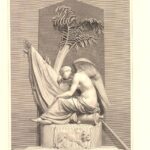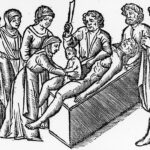19 August 1849: The last bull-baiting at Lydgate Wakes, Saddleworth
Giles Shaw, Ed. 1887. Ashton Parish Church. The Wakes at Lees-cum-Hey, Lydgate, etc. Local Notes and Gleanings: Oldham and Neighbourhood in Bygone Times. Oldham: Oldham Express. Get it:
.Unedited excerpt
If an excerpt is used in the book, it will be shorter, edited and, where applicable, translated.
The following are a few particulars relative to the Wakes at Lydgate, held on the first Sunday after the 15th of August, and Lees-cum-Hey, celebrated on the first Saturday in August and several following days. A few years ago Lydgate Wakes was described as consisting of “an old woman and part of a barrowful of nuts!” Latterly, however, things have grown worse, and, in the style of Diogenes, it has been necessary to seek it with a lantern and candle. But it was not once so. Half a century ago, beside the chapel yard lay a grassy plot of land, well known as the village green. It had an area of about a Lancashire acre, and at the Wakes was the scene of the annual bull bait. Then, whilst a concourse of the more venturesome folk thronged around the dogs and bull, the more timorous sat on the roof of the bone house watching the progress of the fray. It these latter were safe from unpleasant effects in case, as not infrequently happened, the enraged Taurus broke loose from the stake, on the other hand, they debarred themselves from personal participation in the phase of sensational fun and excitement alluded to in an old Derbyshire song:
The bull gave a rush and a very great roar;
He tossed up the dogs and the folks tumbled o’er.
Although the first parliamentary legislation was ineffectual in putting down the bating of various animals, yet in 1835 an act was passed which, supported by the growing intelligence of the country, settled the matter for ever. The last bull bait held at Lydgate took place about thirty-seven years ago, when William Radcliffe, better known as “Owd Billy Potbo,” a small farmer at Quick Edge, was the constable for that portion of the township of Saddleworth. Mr. Radcliffe was the superintendent of the Springhead Congregationalist Sunday School, and had the courage to summon a good many persons who had been engaged in the “sport.” A local rhymester, Edmund Buckley, who lived near Lees, wrote a song, of which the following stanzas are all that his son James remembers:
Lydgate Bull-Bait.
Last August, on a certain day,
To Lydgate Hill I took my way;
With Ned and Sam I did agree
That Lydgate Wakes we’d go and see.
As soon as e’er I entered the town
A man the Wakes was crying down;
‘Twas silence all, both great and small,
To hear the song of “Potten Ball.”
When “Potten Ball” began his song,
He warning save to old and young,
And said, “Ah! drunkards, be aware,
And ye that lie, game, cheat, and swear,
For ne’er of late has pastime been
But you’ve assembled on our green
With cocks to fight, or trails to run,
Or bulls to bait, for to cause fun.
Comment
Comment
My date. The author says it was approximately 37 years before his date of writing, 1886, so perhaps 1849. The first Sunday after August 15th was the 19th. The year is confirmed roughly by records locating the remarkable-sounding William Radcliffe at (Quick Edge,) Mossley:
- 1841 Census, Mossley: Hannah Radcliffe 50, Betty Radcliffe 20, Jane Radcliffe 15, Wm Radcliffe 14
- 1847 William Radcliffe marries Harriet Fielding at St. Michael, Mottram in Longdendale
- 1851 Census, Mossley: William Radcliff 24 Cotton Spinner, Harriet Radcliff 23 Cotton Reeler, Hannah Radcliff 63, John Radcliff 1
- 1861 Census, Quick Edge, Mossley: William Radcliffe 34 Cotton Spinner, Harriet Radcliffe 33, John Radcliffe 11 Cotton Piecer, Martha Radcliffe 7, Frederic Radcliffe 7, Joseph Radcliffe 5, William Radcliffe 5
- 1871 Census, Crown Point, Quickedge: Wm Radcliffe 44 Farmer, Harriet Radcliffe 43, John Radcliffe 21 Farm Labourer, Martha Radcliffe 17 Cotton Weaver, Frederick Radcliffe 17 Cotton Piecer, Joseph Radcliffe 15 Cotton Piecer, William Radcliffe 15 Cotton Piecer, James Radcliffe 8
- 1881 Census, George Inn, 1 Stamford Street, Mossley: William Radcliffe 54 Publican [not bad for a Congregationalist!], Harriet Radcliffe 54, John Radcliffe 31 Cellarman, Joseph Radcliffe 24 Barman, William Radcliffe 14 Waiter
- William Radcliffe of Mossley, aged 56, buried 12 Oct 1883, St George, Mossley, left effects of £2,016 7s 8d [251K in 2020] to widow Harriet Radcliffe, son John Radcliffe Innkeeper of The George, son Frederick Radcliffe farmer at Quick Farm
A recent guide to St. George’s churchyard confirms some of this (Vaughan 2020).
30 years later local poet Ammon Wrigley used the same source but somehow concluded that 1886 – 37 = 1833 (Wrigley 1916). He comments, perhaps thinking of the great war proceeding at the time of his publication:
In 1802, a bill to abolish Bull baiting was introduced into the House of Commons. Wilberforce, the slavery abolitionist, and other prominent men, spoke strongly in its favour, but failed to save the measure. The spirit of the arguments which led to its rejection may be gathered from the speech of Windham, a famous speaker in his day, who expressed the opinion “that the bull and ring in which it was baited were the best recruiting sergeants for the army that England possessed.” That was the period of the great wars with France, and the country was badly in need of recruits. Some people may raise their hands in holy horror, but I think no worse of my ancestry because they were cockfighters and bull baiters. If I have read history aright, I have found that the cockfighting, bullbaiting and dogfighting men of England were the only men in the world who held in check and finally crushed Napoleon. In the wars of the early part of the 19th century one finds that the old bulldog breed never lost its hold, but chewed its way from grip to grip to the vitals of the foe.
The bone house was probably in the chapel yard and contained the bones of the dead. Beowulf: Ne wæs ecg bona, ac him hildegrap heortan wylmas, banhus gebræc.
Something to say? Get in touch
Similar
 28 July 1809: The Napoleonic career of Richard Beckett of the Coldstream Guards, Meanwood (Leeds), and the MCC, who fell today at Talavera (Toledo)
28 July 1809: The Napoleonic career of Richard Beckett of the Coldstream Guards, Meanwood (Leeds), and the MCC, who fell today at Talavera (Toledo) 29 December 1759: In an unusual case of genitive determinism, “Julius Caesar” Ibbetson – painter at first of ship’s hulls and later of landscapes – is delivered from his dead mother at Farnley Moor (Leeds)
29 December 1759: In an unusual case of genitive determinism, “Julius Caesar” Ibbetson – painter at first of ship’s hulls and later of landscapes – is delivered from his dead mother at Farnley Moor (Leeds)
Comment
Comment
Necrology op cit. John Hobson says he was called King Jessop (Hobson 1877). Henry Parke, curate at Wentworth: “Great Jessop is a sound divine, / His sense is strong and masculine” (Parke 1819).
I haven’t found Jessop’s parody, but here is a translation of the original, borrowed from Edward Miller’s Doncaster (Miller 1804):
At the seat called The Wood, near Edlington, in the vicinity of Doncaster, Robert Molesworth, Esq. two years before he was created Viscount, had the remains of a favourite greyhound sent down from London, and buried there; over which animal he placed a small square altar monument with a Latin inscription, thus translated:
Stay, traveller,
Nor wonder that a lamented Dog
Is thus interred with funeral honour.
But ah, what a dog !
His beautiful form and snow-white colour,
Pleasing manners and sportful playfulness,
Affection, obedience, and fidelity,
Made him the delight of his master,
To whose side he closely adhered.
With his eager companions of the chase,
He delighted in attending him.
Whenever the mind of his lord depressed,
He would assume fresh spirit and animation.
A master, not ungrateful for his merits,
Has here in tears deposited his remains
In this marble urn.
M.F.C.Tradition says, the above dog saved his master’s life in the following manner: when going to the privy, he pulled him by the flap of his coat, and would not let him proceed. On a second attempt, the dog behaved in the same manner. Surprised at this interruption, he ordered one of his servants to go to the place, who, on opening the door, was immediately shot dead by a villain there concealed, whose intention was most probably to rob the house when the family had retired to rest (Miller 1820).
Here is a fairly useless photo of the dog monument ca. 1930. Has anyone got something better?
Something to say? Get in touch
Search
Donate
Music & books
Place-People-Play: Childcare (and the Kazookestra) on the Headingley/Weetwood borders next to Meanwood Park.
Music from and about Yorkshire by Leeds's Singing Organ-Grinder.


 Bluesky
Bluesky Extwitter
Extwitter